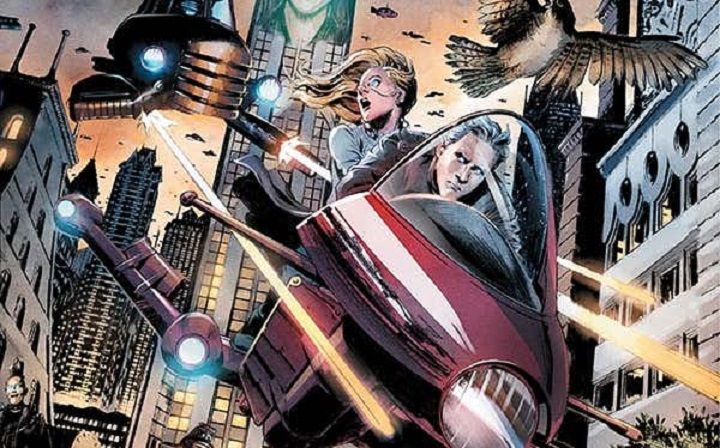
First Comics News: How did you end up creating “Myopia” where did the idea come from?
Richard Dent: I was always a huge fan of dystopian fiction and Myopia just sort of emerged from this passion. I didn’t really know what the story was going to be until I started writing.
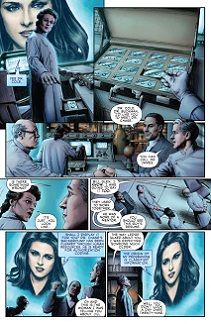
1st: Can you give us a brief idea of the story in “Myopia”?
Richard: Myopia takes place two hundred years in the future in a society that has grown dependent on The Formula Media Lens. The government steps in and takes control of the company that makes the lenses and starts using them to manipulate what people see and think. We are also post energy crisis and the world has entered into something called the Magnetic Energy Agreement, an international law that forbids dependency on one source of energy over another.
1st: There is some nice artwork in the comic who is responsible for it and what do you think of it?
Richard: My primary artist is Patrick Berkenkotter, and I think he’s incredibly talented. On the second issue, he received a little help from Ronilson Freire who did the almost impossible task of matching Patrick’s work. Patrick’s attention to detail is probably what I love most about his work. He also has a great eye for perspective and layout. Ronilson is also quite capable of incredible detail and design.
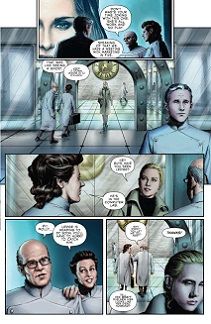
1st: Why is Bill Glen important to this comic book?
Richard: Bill Glen developed fundamental programs and technology that run the Formula Media Lens. In issue 2 there is innuendo that he is tied into a bigger conspiracy, but what it is, nobody is quite sure.
1st: Who else is in the pages of “Myopia” that we should care about?
Richard: James Chase is Bill Glenn’s protégé; Matthew Glen, Bill’s Glenn’s son, seems to know something nobody else knows about his father’s work at Formula Media; and Molly Glen is trying to hold her family together. We also have Ledge Carver who is the CEO of Formula Media and Agni Shelton, the head of Lens Security, who is starting to make things quite difficult for Ledge and the Glenn’s.
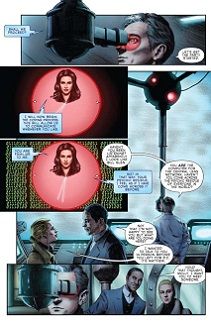
1st: What is the main selling point of “Myopia”
Richard: Aside from the great writing and amazing illustration?! Seriously the great writing and the amazing illustration. That and there is a resurgence of old dystopian novels lately and Myopia brings this classic feel into a more contemporary setting.
1st: Would “Myopia” make a good movie, why or why not?
Richard: Myopia was originally a screenplay, so it would naturally do well on the big screen.
1st: Would you use the Formula Media lenses if they existed today for real?
Richard: Absolutely. They’re the coolest devices ever!
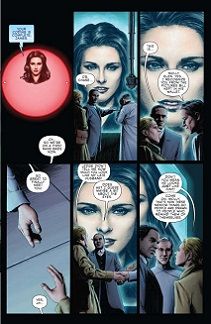
1st: How many issues are there going to be of ‘Myopia’ and would you like to see it.
Richard: Right now, there is a thick (40 pages per issue) four-issue story arch, but I already have some ideas for the next story arch. This is truly an expandable universe.
1st: Why do you keep writing comics?
Richard: I write in a lot of genres. Right now, I’m really digging comics. I love the collaboration, and I love the tools–especially how a writer can essentially tell two stories at the same time or work in two different timelines at the same time by using panels and lettering. I also love how everything that is usually left to the reader’s imagination in a prose novel can be shown with just a fraction of the cost it would take to display it on film.
1st: Which comic book character and not just from comics you worked on but anyone, are you most like and why?
Richard: Nobody has ever asked me that before. I guess Professor X. I like the idea that I’m so smart it hurts!
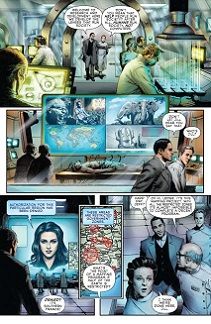
1st: How or what do you attribute your success to?
Richard: I put years into learning how to write. I went for school for it. I failed a lot. But I kept with it and that’s all you can do.
1st: What is the most enjoyable way for you to spend your day?
Richard: I love writing first thing in the morning until I just don’t want to write anymore, then I go to the gym and think about what I wrote, make notes and grade papers then wind down with friends and family if time permits. The days I work I try and stick to the same schedule, albeit more truncated.
1st: What do you have to say to those who read your work?
Richard: Thank you!
